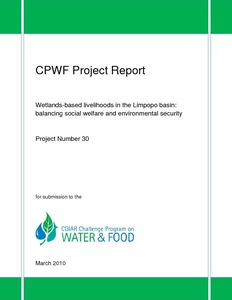Resource information
This report is a synthesis of research implemented for the project on Wetlands-based livelihoods in the Limpopo basin: balancing social welfare and environmental security. The research was motivated by the dependency of many people on wetlands for their livelihoods. It was therefore founded on the basis that the potential of wetlands to contribute to livelihoods is closely related to their ability to maintain ecosytem functions (such as regulating river flows), which is a consequence of their unique hydrological characteristics. The research aimed to contribute to wetland management and ultimately contribute towards ensuring environmental sustainability (MDG7) through the maintenance of vital ecosystem services provided sustainable agricultural practices (in terms of sound hydrological and pollution management) and balanced exploitation of resources are practised.
The project aimed to contribute to enhancing food security and improving the livelihoods of wetland-dependent communities by increasing productivity of water and optimizing and maintaining wetland ecosystem services.
Specifically the project aimed to
?? Develop and apply a trade-offs based framework for making decisions about allocations of wetland resources to specific uses, including agriculture.
?? Determine the trade-offs among different agricultural uses of wetland water and the trade-offs between each of the agricultural water uses and environmental use; develop guidelines on acceptable levels of wetland water use for agriculture; and encourage this as best practice.
?? Identify as part of the trade-off analysis who benefits, e.g., poor women and men farmers, herders, fisher folk; local business people; etc.
?? Enhanced capacity of wetland users, researchers, extension officers, natural resource managers, and policy makers.
The most important achievements of the project are the new knowledge and tools captured in the three main outputs of the project – the Framework for inventory, the WETSYS tradeoff model, and the Guidelines for sustainable management - and the partnership and capacity building that resulted from implementation of the project that provide the basis for impact.
The Framework for undertaking wetland inventory, assessment and monitoring in the Limpopo basin, and the tradeoffs model (WETSYS) satisfy the first objective. Objectives two and three were addressed through analysis in case study wetlands as presented in various reports and MSc thesis and summarized here, and in a synthesis that constitutes the third main output of the project: 3) the Guideline for sustainable wetland management and utilization. The forth objective was achieved through engagement of numerous undergraduate and MSc students, direct project engagement with various local extension officers and natural resource managers and through dissemination of new information to higher level decision makers, and feedback workshops to the communities that served the purpose of increasing awareness of wetland value, goods and services.


